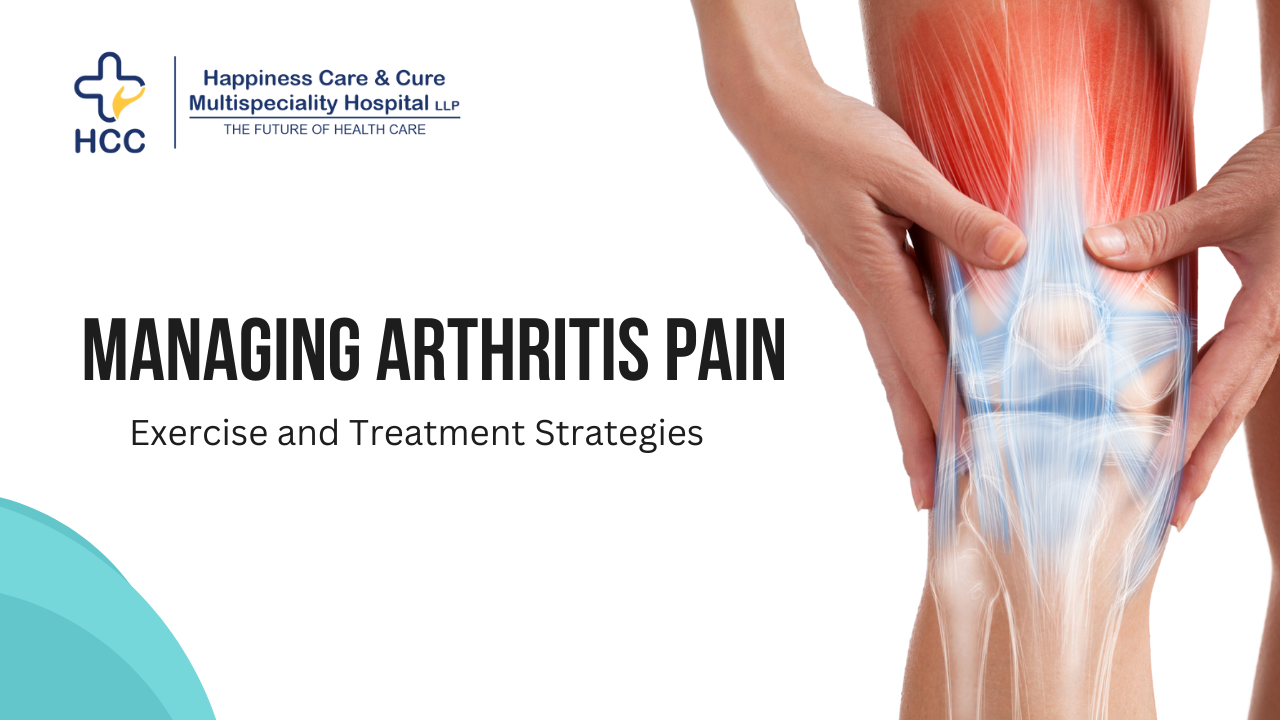
Arthritis affects millions worldwide, causing discomfort and hindering daily activities. As a prevalent condition impacting joints, it necessitates effective management strategies for pain relief and improved quality of life. In this blog, we delve into the insights offered by renowned orthopedic surgeon Dr. Urang Patel from HCC Hospital in Ahmedabad, unveiling a comprehensive approach to managing arthritis pain through exercise and various treatment strategies.
Introduction to Arthritis
Arthritis encompasses various joint disorders, affecting people of all ages. From osteoarthritis to rheumatoid arthritis, these conditions pose challenges, leading to pain, stiffness, and limited mobility. Understanding the impact of arthritis on daily life is crucial in addressing its complexities and devising suitable management plans.
Understanding Arthritis Pain
Pain associated with arthritis can be debilitating, impacting both physical and mental well-being. Recognizing the causes and symptoms of this pain is pivotal in formulating effective treatment strategies. Dr. Patel emphasizes the importance of managing arthritis pain comprehensively to alleviate discomfort and enhance the patient's overall lifestyle.
Dr. Urang Patel: Orthopedic Expert
Dr. Patel stands as an eminent figure in the field of orthopedics, renowned for expertise in managing arthritis. With a rich background and specialized knowledge, his approach to treating arthritis extends beyond conventional methods, focusing on holistic patient care and personalized treatments tailored to individual needs.
Exercise as a Treatment for Arthritis
Exercise serves as a cornerstone in managing arthritis pain. It not only improves joint flexibility but also strengthens muscles, easing the burden on affected joints. Dr. Patel advocates for specific exercises catering to arthritis patients, emphasizing their role in enhancing mobility and reducing discomfort.
Treatment Strategies Beyond Exercise
While exercise plays a pivotal role, treatment strategies for arthritis encompass a spectrum of options. Medications offer relief from pain and inflammation, while surgical interventions become necessary in severe cases. Dr. Patel sheds light on these diverse treatment modalities and their appropriate applications.
Dr. Patel's Approach to Pain Management
Dr. Patel adopts a holistic approach to pain management, incorporating non-pharmacological methods alongside conventional treatments. Personalized plans addressing dietary modifications, stress management, and alternative therapies form the core of his patient-centric approach.
Lifestyle Changes for Arthritis Relief
Diet and stress play significant roles in managing arthritis pain. Dr. Patel advocates for dietary changes that can alleviate inflammation, along with stress management techniques to reduce pain triggers, contributing to overall relief.
Support Systems for Arthritis Patients
Acknowledging the emotional toll of arthritis, Dr. Patel emphasizes the importance of support networks. Community resources and support groups play a crucial role in providing encouragement and valuable information for patients navigating their arthritis journey.
Conclusion
Managing arthritis pain demands a multifaceted approach, blending exercise, tailored treatments, lifestyle modifications, and a strong support system. Dr. Urang Patel's comprehensive methodology underscores the significance of holistic care, empowering patients to effectively manage their condition and lead fulfilling lives.
FAQ's
Q: What are the early signs of arthritis?
A: Early signs often include joint stiffness, mild pain, and swelling.
Q: Can weather affect arthritis pain?
A: Some individuals report increased pain during certain weather conditions, although scientific evidence on this remains inconclusive.
Q: Is yoga beneficial for arthritis patients?
A: Yes, yoga can improve flexibility and reduce joint pain if practiced under proper guidance and with modifications.
Q: Are there specific foods that worsen arthritis symptoms?
A: Certain foods high in sugar, processed fats, and refined carbohydrates might exacerbate inflammation in some individuals.
Q: Can weight loss help in managing arthritis?
A: Yes, shedding excess weight can significantly reduce pressure on joints, easing pain and improving mobility.
Q: How does arthritis affect mental health?
A: Chronic pain from arthritis can lead to anxiety, depression, and decreased quality of life for some individuals.
Q: Can physical therapy alleviate arthritis symptoms?
A: Yes, tailored physical therapy programs can strengthen muscles, improve joint function, and reduce pain.
Q: Are there natural supplements that can help with arthritis pain?
A: Some supplements like glucosamine and chondroitin may offer relief to some individuals, but results vary.
Q: Is swimming a good exercise for arthritis patients?
A: Swimming and water aerobics are often recommended as they are gentle on joints while providing good exercise.
Q: Can stress management techniques reduce arthritis pain?
A: Yes, stress reduction techniques like meditation and mindfulness can help alleviate symptoms in some individuals.
Q: Is there a cure for arthritis?
A: Currently, there is no cure for arthritis, but effective management strategies can significantly improve quality of life.
Q: Can arthritis occur in young adults?
A: Yes, certain types of arthritis, like juvenile arthritis, can affect children and young adults.
Q: Are there specific exercises to avoid with arthritis?
A: High-impact exercises like running or jumping may exacerbate joint pain; it's advisable to consult a healthcare professional for personalized advice.
Q: What role does inflammation play in arthritis?
A: Inflammation is a key factor in arthritis, causing joint pain, swelling, and stiffness.
Q: Can acupuncture help in managing arthritis symptoms?
A: Some individuals report relief from arthritis pain with acupuncture, although its effectiveness varies.
Q: How does arthritis affect sleep patterns?
A: Pain and discomfort from arthritis can disrupt sleep, leading to insomnia or poor sleep quality.
Q: Is cold or heat therapy better for arthritis pain?
A: Both cold and heat therapy can provide relief; however, individual preferences may vary.
Q: Can arthritis lead to disability?
A: In severe cases, arthritis can impair mobility and lead to disability, but proactive management can significantly mitigate this risk.
Q: Can arthritis be hereditary?
A: Some forms of arthritis have a genetic component, increasing the likelihood of developing the condition in certain individuals.
Q: Are there specific ergonomic tools that can assist arthritis patients?
A: Yes, tools like jar openers, ergonomic keyboards, and adaptive utensils can make daily tasks easier for arthritis patients.
Make an Appoinment